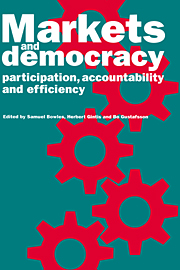Book contents
- Frontmatter
- Contents
- List of figures
- List of tables
- Preface
- 1 Post-Walrasian political economy
- Part I Agency, incentives, and democratic accountability
- Part II Institutions and institutional change
- Part III Conditions for the success of the democratic firm
- Part IV Productivity, distribution, and power
- Part V Ownership, participation and capital markets
- Part VI Political democracy and economic democracy
- 17 Investment planning in market socialism
- 18 Capitalism and democracy: a summing up of the arguments
- Bibliography
- Author index
- Subject index
17 - Investment planning in market socialism
Published online by Cambridge University Press: 05 March 2012
- Frontmatter
- Contents
- List of figures
- List of tables
- Preface
- 1 Post-Walrasian political economy
- Part I Agency, incentives, and democratic accountability
- Part II Institutions and institutional change
- Part III Conditions for the success of the democratic firm
- Part IV Productivity, distribution, and power
- Part V Ownership, participation and capital markets
- Part VI Political democracy and economic democracy
- 17 Investment planning in market socialism
- 18 Capitalism and democracy: a summing up of the arguments
- Bibliography
- Author index
- Subject index
Summary
Introduction
Despite the fact that the phrase “market socialism” has a respectable history, dating back to Lange's (1938) famous contribution in the Austrian debate, there has been little formal economic theorizing on the nature of market socialism. We take market socialism to be a system of economic organization in which (1) the state has the authority to influence the pattern and levels of investment across sectors; (2a) most, if not all, resources are distributed via markets; (2b) citizens, in particular, earn income from labor that is traded on markets; (3a) firms are publicly owned, which means that profits are distributed to members of the population in proportions that are politically determined; and (3b) firms maximize profits. In this chapter, we depart from much contemporary literature (e.g., Miller, 1990 and Estrin and LeGrand, 1989, but not Brus and Laski, 1990), and do not consider the presence of worker-managed firms to be a necessary condition of market socialism.
Given the above characterization of market socialism, two kinds of question naturally arise. The first concerns the consistency of the five characteristics listed above. For example, can one design institutions which will assure that firms maximize profits while at the same time distributing profits diffusely among the population rather than concentrating firm ownership in the hands of stockholders who can trade stock? Is it possible for the government to control the distribution of corporate profits, without interfering with profit-maximization? It is largely these questions that have animated the debate on market socialism in recent years. The second kind of question concerns the flexibility of market socialism.
- Type
- Chapter
- Information
- Markets and DemocracyParticipation, Accountability and Efficiency, pp. 279 - 305Publisher: Cambridge University PressPrint publication year: 1993



